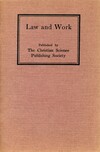

Are you sure?
This bookmark will be removed from all folders and any saved notes will be permanently removed.
The logic of Christian Science
Originally published in the November 16, 1915 issue of The Christian Science Monitor
Logic has been defined as the science on which correct thought depends, the art of attaining, by argument, a correct conclusion, and avoiding an incorrect conclusion. The truths embodied in the theology of Christian Science are based upon a right understanding of God and His attributes, which leads to correct scientific conclusions as to the divine nature of creator and creation. There can be no doubt that the "superb logic" which characterizes all of Mrs. Eddy's writings, makes an appeal to the man on the street who is able to follow and to appreciate the value of the convincing arguments he finds in the teaching of Christian Science. A careful and systematic study of Mrs. Eddy's book, "Science and Health with Key to the Scriptures," and her other writings, will make it apparent to the student that her process of reasoning is the essence of pure logic. Every syllogism in Science and Health is based upon Bible texts. God is perfect, infinite, one, the only creator, and the sequence leads to the conclusion that there is one perfect, infinite creation or universe. God is noumenon, universe is phenomena, the full and complete expression of God. God and man are inseparable—a logical fact uttered by Jesus when he said, "I and my Father are one."
It is a well established rule, of all logical processes, that a complete conclusion is as binding and necessary as are the premises from which it is drawn. Mrs. Eddy's argument is distinguished by her insistence on the importance and validity of this rule, in its application to all conclusions relating to God and His attributes. She says: "Inductive or deductive reasoning is correct only as it is spiritual, induced by love and deduced from God, Spirit; only as it makes manifest the infinite nature, including all law and supplying all the needs of man. Wholly hypothetical, inductive reasoning reckons creation as its own creator, seeks cause in effect, and from atom and dust draws its conclusions of Deity and man, law and gospel, leaving science at the beck of material phenomena, or leaving it out of the question. To begin with the divine noumenon, Mind, and to end with the phenomenon, matter, is minus divine logic and plus human hypothesis, with its effects, sin, disease, and death" (The First Church of Christ; Scientist, and Miscellany, p. 349).
Enjoy 1 free Sentinel article or audio program each month, including content from 1898 to today.
JSH Collections
This article is included in:
1916 - PAMPHLET
Law and work
JSH-Online has hundreds of pamphlets, anthologies, and special editions for you to discover.


